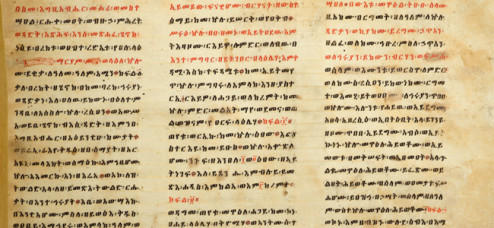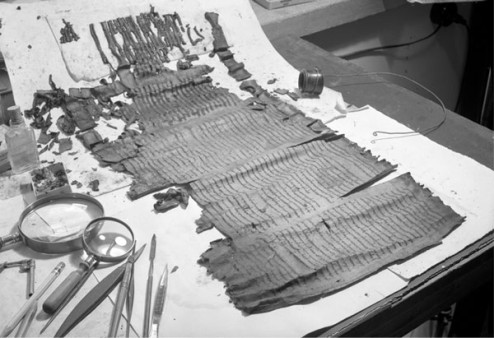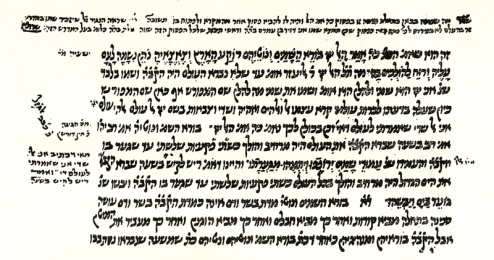Christianity Today has a good interview with Darren Aronofsky which provides some background on the material in the new Noah movie. It seems that Aronofsky and Ari Handel researched a wealth of ancient, primarily Jewish, traditions and texts for material in the movie. These traditions/texts ranged from the Book of Enoch, the Jubilees material, the Genesis Apocryphon text from Qumran and other ancient collections such, Genesis Rabbah, the Talmud, etc. Some of these date from well before the time of Jesus and down to a period 500 years after the New Testament.
I’m not sure how much material from these texts will be used, but here’s just some of the Flood related content in three of them:
ENOCH

The Ethiopic text of First Enoch. Original composition of Enoch was likely around 300 BCE with additions dating to around 100 CE.
There are many elements in these texts that are extra-biblical elaborations on content in the Bible. For example, in the Book of Enoch and Jubilees the Watchers and Nephilim (Angelic beings and those who have “fallen” to earth) are prominent characters. In Enoch the Nephilim are the cause for the explosion of wickedness in the world, greed, injustice, sorcery, sexual immorality:
“And it came to pass when the children of men had multiplied that in those days were born unto them beautiful and comely daughters. And the angels, the children of the heaven, saw and lusted after them, and said to one another: ‘Come, let us choose us wives from among the children of men and beget us children.’ And Semjaza, who was their leader, said unto them: ‘I fear ye will not indeed agree to do this deed, and I alone shall have to pay the penalty of a great sin.’ And they all answered him and said: ‘Let us all swear an oath, and all bind ourselves by mutual imprecations not to abandon this plan but to do this thing.’ Then sware they all together and bound themselves by mutual imprecations upon it. And they were in all two hundred; who descended in the days of Jared on the summit of Mount Hermon, and they called it Mount Hermon, because they had sworn and bound themselves by mutual imprecations upon it. And these are the names of their leaders: Samîazâz, their leader, Arâkîba, Râmêêl, Kôkabîêl, Tâmiêl, Râmîêl, Dânêl, Ezêqêêl, Barâqîjal, Asâêl, Armârôs, Batârêl, Anânêl, Zaqîel, Samsâpêêl, Satarêl, Turêl, Jomjâêl, Sariêl. These are their chiefs of tens.
“And all the others together with them took unto themselves wives, and each chose for himself one, and they began to go in unto them and to defile themselves with them, and they taught them charm and enchantments, and the cutting of roots, and made them acquainted with plants. And they became pregnant, and they bare great giants, whose height was three thousand ells: Who consumed all the acquisitions of men. And when men could no longer sustain them, the giants turned against them and devoured mankind. And they began to sin against birds, and beasts, and reptiles, and fish, and to devour one another’s flesh, and drink the blood. Then the earth laid accusation against the lawless ones.
“And Azazel taught men to make swords, and knives, and shields, and breastplates, and made known to them the metals of the earth and the art of working them, and bracelets, and ornaments, and the use of antimony, and the beautifying of the eyelids, and all kinds of costly stones, and all colouring tinctures. And there arose much godlessness, and they committed fornication, and they were led astray, and became corrupt in all their ways. Semjaza taught enchantments, and root-cuttings, Armaros the resolving of enchantments, Baraqijal (taught) astrology, Kokabel the constellations, Ezeqeel the knowledge of the clouds, Araqiel the signs of the earth, Shamsiel the signs of the sun, and Sariel the course of the moon. And as men perished, they cried, and their cry went up to heaven . . .
“And then Michael, Uriel, Raphael, and Gabriel looked down from heaven and saw much blood being shed upon the earth, and all lawlessness being wrought upon the earth.”
(Enoch 6.1–9.1 PSEUDEPIGRAPHA)
The birth of Noah is described in the following manner, where Lamech has a question about whether Noah is actually his son or of a more divine (or angelic) lineage:
“And after some days my son Methuselah took a wife for his son Lamech, and she became pregnant by him and bore a son. And his body was white as snow and red as the blooming of a rose, and the hair of his head and his long locks were white as wool, and his eyes beautiful. And when he opened his eyes, he lighted up the whole house like the sun, and the whole house was very bright.
“And thereupon he arose in the hands of the midwife, opened his mouth, and conversed with the Lord of righteousness. And his father Lamech was afraid of him and fled, and came to his father Methuselah. And he said unto him: ‘I have begotten a strange son, diverse from and unlike man, and resembling the sons of the God of heaven; and his nature is different and he is not like us, and his eyes are as the rays of the sun, and his countenance is glorious. And it seems to me that he is not sprung from me but from the angels, and I fear that in his days a wonder may be wrought on the earth. And now, my father, I am here to petition thee and implore thee that thou mayest go to Enoch, our father, and learn from him the truth, for his dwelling-place is amongst the angels.’
“And when Methuselah heard the words of his son, he came to me to the ends of the earth; for he had heard that I was there, and he cried aloud, and I heard his voice and I came to him. And I said unto him: ‘Behold, here am I, my son, wherefore hast thou come to me? And he answered and said: ‘Because of a great cause of anxiety have I come to thee, and because of a disturbing vision have I approached.
“And now, my father, hear me: unto Lamech my son there hath been born a son, the like of whom there is none, and his nature is not like man’s nature, and the colour of his body is whiter than snow and redder than the bloom of a rose, and the hair of his head is whiter than white wool, and his eyes are like the rays of the sun, and he opened his eyes and thereupon lighted up the whole house. And he arose in the hands of the midwife, and opened his mouth and blessed the Lord of heaven.
“And his father Lamech became afraid and fled to me, and did not believe that he was sprung from him, but that he was in the likeness of the angels of heaven; and behold I have come to thee that thou mayest make known to me the truth.’
And I, Enoch, answered and said unto him: ‘The Lord will do a new thing on the earth, and this I have already seen in a vision, and make known to thee that in the generation of my father Jared some of the angels of heaven transgressed the word of the Lord. And behold they commit sin and transgress the law, and have united themselves with women and commit sin with them, and have married some of them, have begot children by them. And they shall produce on the earth giants not according to the spirit, but according to the flesh, and there shall be a great punishment on the earth, and the earth shall be cleansed from all impurity. Yea, there shall come a great destruction over the whole earth, and there shall be a deluge and a great destruction for one year. And this son who has been born unto you shall be left on the earth, and his three children shall be saved with him: when all mankind that are on the earth shall die [he and his sons shall be saved].
“And now make known to thy son Lamech that he who has been born is in truth his son, and call his name Noah; for he shall be left to you, and he and his sons shall be saved from the destruction, which shall come upon the earth on account of all the sin and all the unrighteousness, which shall be consummated on the earth in his days. And after that there shall be still more unrighteousness than that which was first consummated on the earth; for I know the mysteries of the holy ones; for He, the Lord, has showed me and informed me, and I have read (them) in the heavenly tablets.
“And I saw written on them that generation upon generation shall transgress, till a generation of righteousness arises, and transgression is destroyed and sin passes away from the earth, and all manner of good comes upon it. And now, my son, go and make known to thy son Lamech that this son, which has been born, is in truth his son, and that (this) is no lie.’”
(Enoch 106.1–107.2 PSEUD)
While Enoch is not included in the Jewish or Christian canons of scripture (with the exception of segments of some Ethiopian Orthodox churches), it is clear that it was popular among groups of both Jews and Christians in the first and second centuries. As a matter of fact, both Jude and 2 Peter in the New Testament either quote or allude to passages in the Book of Enoch.
The Genesis Apocryphon
Some of these traditions/texts are fascinating in what they do with the legends, in particular regarding the fallen angelic beings. In the fragmentary Genesis Apocryphon, as in Enoch, Lamech wonders whether Noah was actually his son or the son of one of the fallen beings. Each numbered line below represents a line from folio 2 of 1Q20, the Genesis Apocryphon scroll found in cave 1 at Qumran (note that both ends of lines are damaged, with brackets and ellipses indicating restored or missing text):
2 Then I decided that the conception was at the hands of Watchers, that the seed had been planted by Holy Ones or Nephil[im].
3 I was in a turmoil because of this infant.
4 Then I, Lamech, hurriedly went in to [my] wi[fe], Bitenosh, [and I said to her,]
5 [“I adjure you by …] and by the Most High, by the Lord, the Great One, by the King of all Et[ernity … have you conceived]
6 [by one of ] the Sons of Heaven? Tell me every detail truthfully […]
7 [in truth] make it known to me, without lies. Was this […]
8 And in a vision he spoke with me, and stood before me […]
9 an emissary of the Great Holy One proclaimed to me in a voice, ‘To you they say, “Noah! […] ”(1Q20 2.1–9 QUMENG)
Lamech’s wife begs him to accept that Noah is his child:
“I swear to you by the Great Holy One, by the King of He[aven …] that this seed comes from you, this conception was by you, the planting of [this] fruit is yours [… It was] not by any stranger, neither by any of the Watchers, nor yet by any of the Sons of Heav[en.]”
But Lamech wants to seek the counsel of his father Methuselah and grandfather Enoch. Unfortunately, we never get to hear their answer in the fragmentary text (though it seems clear, as is recorded in Enoch, that Noah is Lamech’s son). It is lost with the ravages of time. We do have in the text, however, Noah’s own understanding of his purpose:
5.29 [A copy:] The Book of the Words of Noah […]
6.1 from iniquity, and in the crucible of she who bore me I sprouted for righteousness. So when I emerged from my mother’s womb, I was planted for righteousness,
6.2 and it was righteousness that I practiced all of my days. I continued to walk in the paths of the eternal truth, accompanied by a holy […]
6.3 righteousness hastened on my paths, and to warn me about the […] of falsehood that lead to darkness and to […]
6.4 […] I girded my loins with a vision of righteousness, and wisdom as a robe […]
Genesis Rabbah
In the collection of Rabbinic discussions and midrash (commentary) about Genesis, there are other fascinating interpretations and elaborations of the biblical material. If you want, simply start reading it here, and you will see what I mean in just a page or so. For example, in discussion of the phrase in Genesis 6:1 that men “multiplied on the earth”, the Genesis Rabbah explains:
“This teaches that they spilled their semen on the trees and stones, and because they were steeped in lust the Holy One, blessed be He, gave them many women, as it is written: ‘And it came to pass, when men began to multiply . . . and daughters were born unto them [i.e., more females were born than males to provide for the lust of men].’”
From the perspective of Genesis Rabbah, the “sons of God” do not represent fallen angels, but the sons of corrupt nobles who took advantage of other men’s wives and daughters, as well as propagated violent injustice (Hebrew ḥamas). However, the Nephilim do represent fallen, giant beings (“…one’s thighbone was 18 cubits (24 feet) long…”). They “cast the world into ruin, were themselves driven from the world in ruin, and caused the world to be ruined.”
Concerning Noah, the Rabbis said many things, but in one of the discussions (as alluded to in the Aronofsky interview), Noah is said to be righteous only in comparison with his own wicked generation, with Rabbi Judah arguing that in other generations he would not have been that righteous:
“…Rabbi Judah said, ‘Only in his own generation was he considered righteous; had he flourished in the generation of Moses or Samuel, he would not have been called righteous: in the street of the totally blind, the one-eyed man is called clear-sighted, and the infant is called a scholar. It is as if a man who had a wine vault opened one barrel and found it vinegar; another and found it vinegar; the third, however, he found turning sour. “It is turning,” people said to him. “Is there any better here?” he retorted. Similarly, “In his generations he was a righteous man.’”
Rabbi Nehemiah disagreed:
“If he was righteous even in his generation, how much more so [had he been so] in the age of Moses. He might be compared to a tightly closed vial of perfume lying in a graveyard, which nevertheless gave forth a fragrant odor; how much more then if it were outside the graveyard.”
This debate also takes place in the Talmud. Some rabbis have taught that Noah is not as righteous as Abraham because, when told about the divine plans to destroy Sodom and Gomorrah, Abraham interceded for his fellow human beings while Noah did not. Ultimately, in the Rabbah material, the conclusion is, relative to his age or not, that Noah was a righteous man:
“Rabbi Jonathan said: ‘A potter does not test defective vessels, because he cannot give them a single blow without breaking them. Similarly, the Holy One, blessed be He, does not test the wicked but only the righteous, thus “The Lord tries the righteous (Psalm 11:5)”. Rabbi Jose Son of Rabbi Ḥanina said, ‘When a flax worker knowns that his flax is of good quality, the ore he beats it the more it improves and the more it glistens; but if it is of inferior quality, he cannot give it one knock but it splits. Similarly, the Lord does not test the wicked but only the righteous.’ Rabbi Eleazer said, ‘When a man possesses two cows, one strong and the other feeble, upon which does he put the yoke? Surely upon the strong one. Similarly, the Lord tests none but the righteous.’”
Regarding the destruction of life in the Flood, God is said to have grieved for the world before destroying it:
“‘And it came to pass after the seven days (Genesis 7:10)’: This teaches that the Holy One, blessed be He, gave them a respite during the seven days’ mourning for the righteous Methuselah, so that they might repent but they did not … Rabbi Joshua son of Levi said, ‘Seven days the Holy One, blessed be He, mourned for His world before bringing the Flood,’ the proof being the text, ‘And it grieved Him (Gen. 7.6),’ while elsewhere we read, ‘The king grieved for his son (2 Samuel 14:3).’”
The understanding of geography in the rabbinic discussion is interesting as well. For example once the flood happens and the dove is sent out, the dove is said to have either gone to the Mount of Olives or to the Garden of Eden itself:
“Rabbi Birai said: ‘The gates of the Garden of Eden were opened for her, and from there she brought it.’ Said Rabbi Abbahu, ‘Had she brought it from the Garden of Eden, should she have not brought something better, for example, cinnamon or the balsam leaf? But in fact she gave him a hint, saying to him [in effect]: “Noah, better is bitterness [of the olive leaf] from this source [Eden], than sweetness from your hand.”’”
Again, I don’t know how much of this type of material will be in the movie, but it’s fascinating to me that they are bringing a modern take to these ancient sources.



Pingback: Threshing Floor Podcast 14: Noah
Pingback: Threshing Floor Podcast 014: Noah | Do You Really Believe?